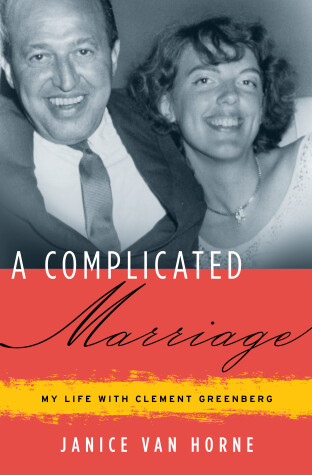
In 1955, Jenny Van Horne was a 21-year-old, naive Bennington College graduate on her own for the first time in New York City when she met 46–year–old Clement Greenberg who, she is told, is "the most famous, the most important, art critic in the world" and soon finds herself swept into his world and the heady company of Hans Hofmann, Willem de Kooning, Franz Kline, David Smith, Helen Frankenthaler, among others. Seven months later, as a new bride, Jenny and Clem spend the summer in East Hampton near Jackson Pollock and Lee Krasner, and she feels even more keenly like an interloper in the inner circle of the art scene. A woman disowned by her anti–Semitic family for marrying a Jew, she would develop a deep, loving bond with Clem that would remain strong through years of an open marriage and separate residences.
Jenny embodies the pivotal changes of each passing decade as she searches for worlds of her own. She moves from the tradition of wife and mother to rebellion and experimentation; diving into psychoanalysis; the theater world of OOB and the Actors' Studio; and succeeding in business. Throughout, A Complicated Marriage is grounded in honesty and the self–deprecating humor, grace, and appealing voice of its author.
Janice Van Horne was so young when she met Clement Greenberg, complete with all the insecurities that come along with being in one's early 20's. I was struck by what an unlikely pair they seemed. She points out they were alike "in the ways that mattered," and the comfort they found in each other's presence shines throughout the book.
Their relationship begins in the mid-50's, when women still had very distinct, traditional roles. Van Horne adheres to these expectations, but at the same time pushes (and breaks) them. I liked that about her. Over the decades, women become more liberated and it becomes easier for Van Horne to find herself and fit in. She overcomes the stigma of her "mother-the-martyr's daughter" and settles into her own identity with confidence and independence, especially after realizing she needed to learn to "outwit the lure of losing [herself] in a man." In this sense, her memoir is much like a coming-of-age story.
Van Horne sometimes writes with an overly dramatic flair. Also, the book could have been a tad shorter. She goes into detail about a number of more mundane aspects of daily life; at first this was charming, but after a while it slowed the pace and I started to feel bogged down.
I enjoyed the vignettes of their friends in the abstract expressionist movement: Jackson Pollock and Lee Krasner, Hans and Miz Hoffman, Jack and Mabel Bush, Franz Kline, and more.
I'm not sure theirs was a "complicated" marriage as much as it was unconventional. At times, very unconventional! Yet I never found myself doubting their love for each other.
I received a copy of this book from the publisher via TLC Book Tours in exchange for an honest review. I did not receive any other compensation for this review.
Reading updates
-
Started reading
-
17 May, 2013:
Finished reading
-
17 May, 2013:
Reviewed
